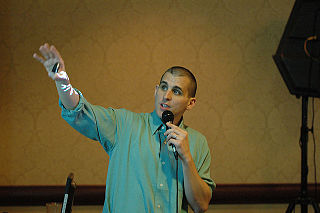A Quote by Simon Sinek
Simple ideas are easier to understand. Ideas that are easier to understand are repeated. Ideas that are repeated change the world.
Quote Topics
Related Quotes
It is no exaggeration to say that every human being is hypnotized to some extent either by ideas he has uncritically accepted from others or ideas he has repeated to himself or convinced himself are true. These negative ideas have exactly the same effect upon our behavior as the negative ideas implanted into the mind of a hypnotized subject by a professional hypnotist.
The ability of nonintelligent people to understand the most complicated mechanisms and to use them has always been to me a cause of astonishment: their inability to understand simple questions is even more astonishing. The general acceptance of simple ideas is difficult and rare, and yet it is only when simple, fundamental, ideas have been accepted that further progress becomes possible on a higher level.
The acts of the mind, wherein it exerts its power over simple ideas, are chiefly these three: 1. Combining several simple ideas into one compound one, and thus all complex ideas are made. 2. The second is bringing two ideas, whether simple or complex, together, and setting them by one another so as to take a view of them at once, without uniting them into one, by which it gets all its ideas of relations. 3. The third is separating them from all other ideas that accompany them in their real existence: this is called abstraction, and thus all its general ideas are made.
I do not believe that it can be too often repeated that the freedoms of speech, press, petition and assembly guaranteed by the First Amendment must be accorded to the ideas we hate or sooner or later they will be denied to the ideas we cherish. The first banning of an association because it advocates hated ideas - whether that association be called a political party or not - marks a fateful moment in the history of a free country.
All great tasks test our motivation. It's easy to court ideas over beers and change the world with napkin sketches, but like most things taken home from bars, new challenges arise the next day. It's in the morning light when work begins, and grand ideas (or barroom conquests) lose their luster. To do interesting things requires work and it's no surprise we abandon demanding passions for simpler, easier, more predictable things.
Karl Marx said, “The task is not just to understand the world but to change it.” A variant to keep in mind is that if you want to change the world you’d better try to understand it. That doesn’t mean listening to a talk or reading a book, though that’s helpful sometimes. You learn from participating. You learn from others. You learn from the people you’re trying to organize. We all have to gain the understanding and the experience to formulate and implement ideas.



































